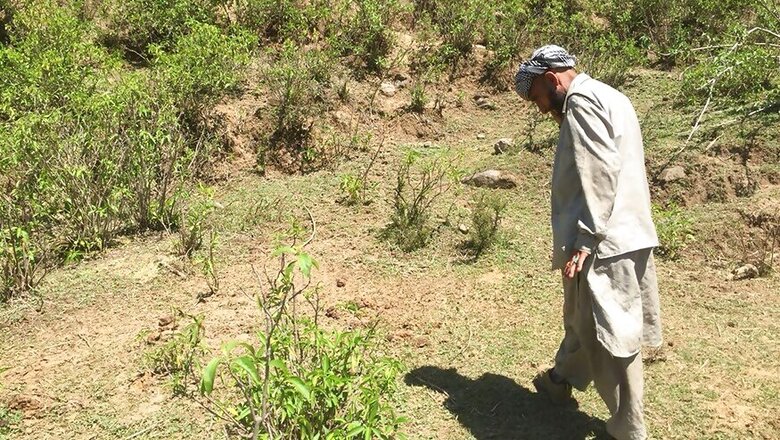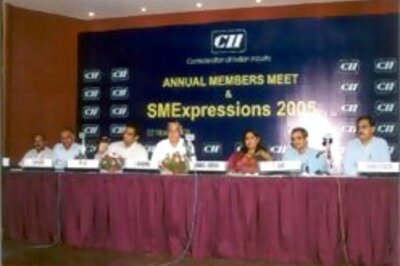
views
 In January, when local police began investigations into the abduction, torture, gang-rape and murder of eight-year-old girl in Kathua, it found her to be a victim of another brutality. In the earlier days of investigation some police officers, who did not want to be named, said they were also probing the angle of hate crime. Subsequent protests in favour of the accused, in which two state ministers and BJP leaders Lal Singh and Chandar Prakash Ganga participated and later resigned after public outrage, only confirmed this suspicion.
In January, when local police began investigations into the abduction, torture, gang-rape and murder of eight-year-old girl in Kathua, it found her to be a victim of another brutality. In the earlier days of investigation some police officers, who did not want to be named, said they were also probing the angle of hate crime. Subsequent protests in favour of the accused, in which two state ministers and BJP leaders Lal Singh and Chandar Prakash Ganga participated and later resigned after public outrage, only confirmed this suspicion.
Three days ago, police made it official through their 15-page chargesheet that the brutality inflicted on the girl was a deliberate attempt 'to dislodge the [Muslim] Bakarwal community' from Jammu. The eight-year-old had become a victim of extremists’ hatred towards the nomadic tribe.
Bakarwals are a sect within the state's Gujjar community. These are Muslim nomadic tribes who earn their keep by trading livestock. The word 'Bakarwal' means goat shepherds. These tribals, notified as Scheduled Tribes within the state, make for 12 percent of the state's population.
Chaudhary Talib Hussain, a young Gujjar activist, says he has witnessed and worked to attract public attention towards regular hate-crimes faced by Bakkarwals and Gujjars.
Talib says he has grown up in the same area where the minor was raped and murdered. “I know the people who are involved in this act. This is not the first time they have committed such kind of crime. I have been protesting against their brutalities, but little attention has been paid to this ongoing campaign against us,” Talib told News18.
This crime, Talib says, only shows the violence with which Gujjars and Bakarwals in Jammu are being marginalised and pushed out of the society.
“When the rally was held in support of the girl’s murderers, senior leaders of big political parties went on to support them. This is what visceral hatred and vote-bank politics have been doing to us," says Talib.
Masud Choudhary, first Gujjar of Jammu and Kashmir to rise to the rank of Additional Director General of Police in Indian Police Service, says that Gujjars and Bakarwals always felt insecure owing to repeated threats and attacks. But there is a different level of complicity by some very powerful local figures in this crime, which makes the murder of the eight-year-old all the more horrific.
“Gujjar and Bakarwal communities were always insecure in Jammu and Kashmir, but this time the problem is that they are being threatened not just by some local goons but by the some powerful ministers and seniors in the administration,” Choudhary says.
Choudhary describes the irony of how Bakarwals, whose people have repeatedly made great sacrifices for India, are now conveniently being branded as 'anti-nationals'.
He recalls this incident from his service.
“There was an operation called Hill Kaka in Poonch in 2003. It was the biggest operation against militants in the area. We had received intel (intelligence report) about presence of a huge number of militants but needed local support to eliminate them. It was only because of the overwhelming support of the local population - Gujjars and Bakarwals - that militants were eliminated," Choudhary says.
But the story doesn't end here.
After suffering losses of around 60 militants, the militant organisations sent more extremists to kill the nomads. The houses of nomads were burnt in retaliation and many were openly slaughtered.
"Many of them also died in operations with the Army,” claims Choudhary.
“But if the things continue to go like this they (tribals) will not do the same. Why should they kill themselves when they are treated as traitors?”
Living in the northern Kashmir’s Kupwara, a teacher from the tribal community says they have suffered on both sides. “Initially we used to be the target of forces also. The forces thought that we are helping militants in crossing LoC.”
He is also the founding Vice-Chancellor of Baba Ghulam Shah Badshah University in Rajouri.
The university vice-chancellor finds that the problem is actually about the settlement of the tribal community.
Talib thinks the bigger problem is not just an existential threat from the majority Hindu community in Jammu but non-acceptance from the Muslims in Kashmir as well. The militant Hindutva leaders spew venom and call Gujjars and Bakarwals anti-nationals, while Kashmiri Muslims are already prejudiced against the Gujjars and Bakarwals.
“Despite being Muslims, Kashmiris never considered our community as a part of their society. They never treat us on par,” says Talib.
“Kashmiris are equally responsible for what is happening with the Gujjars. People in Jammu regions say we are anti-Indians, and in Kashmir, there is social stigma related to our community.”
Gujjar and Bakarwal constitute a large vote share in the state. Presently, there are at least three ministers in the state cabinet who come from the same community.
“In Jammu, the things are clear now; they want to throw us out. But in Kashmir there goes a saying: If you encounter a bear and a Gujjar in a jungle, kill the latter first. There are folklore-based rumours on racial prejudice against us. Where do we go from here now,” says another tribal activist, who wishes to be anonymous.
The tribal community in the state is always grappling with their own issues. They had been participating actively in electoral politics in the hope that their basic issues are addressed.
Members of the community can be found in almost all the districts of the state but most of them live in the outer parts of the state—closer to the border and Line of Control.
In 1991, the government declared the community as scheduled tribe. However, the condition continues to remain miserable.
“Out of 10 people, eight are illiterate. Most of the girls never go to school and are married at very young,” says Javaid Rahi, secretary of Tribal Research and Cultural Foundation a national research organization working for the tribals.
“Most of the Gujjars are economically very poor and their health condition is pathetic. They face food issues. Most of them lack access to basic amenities. The larger part is nomadic or migratory. Government policies are for the settled people,” explain Rahi.
Unlike in the other parts of India, Tribals in Jammu and Kashmir did not enjoy reservations.
“Due to article 370, most of the reservations, that benefit the tribal community in other states, are not extended to our state,” says Rahi, terming it as the major reason for the backwardness of the Tribal community.
“The people of the tribal community have always faced hardships. They are the least privileged and most discriminated,” prominent Gujjar leader Mian Altaf, a former minister in state and incumbent MLA of the opposition party, National Conference, told News18.
“Whatever is happening is a proper strategy against the community. BJP has openly said that they will throw Gujjar Bakarwals out of Jammu region,” says Altaf.
(The author is a freelance journalist. Views are personal)
(More Sunday Features)



















Comments
0 comment